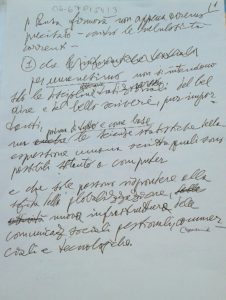
Domenico Fiormonte has recently blogged about an interesting document he has by Father Busa that relates to a difficult moment in the history of the digital humanities in Italy in 2002. The two page “Conditional Agreement”, which I translate below, was given to Domenico and explained the terms under which Busa would agree to sign a letter to the Minister (of Education and Research) Moratti in response to Moratti’s public statement about the uselessness of humanities informatics. A letter was being prepared to be signed by a large number of Italian (and foreign) academics explaining the value of what we now call the digital humanities. Busa had the connections to get the letter published and taken seriously for which reason Domenico visited him to get his help, which ended up being conditional on certain things being made clear, as laid out in the document. Domenico kept the two pages Busa wrote and recently blogged about them. As he points out in his blog, these two pages are a mini-manifesto of Father Busa’s later views of the place and importance of what he called textual informatics. Domenico also points out how political is the context of these notes and the letter eventually signed and published. Defining the digital humanities is often about positioning the field in the larger academic and public political spheres we operate in.
Italian Original Text
Padre Busa assicura che firmerà non appena noi avremo precisato – contro le nebulosità correnti:
1) Che per umanesimo non si intendono solo le discipline letterarie tradizionali del bel dire e del bello scrivere (pur valide e importanti)
ma vanno intese prima di tutto, come base e con priorità d’urgenza, le scienze statistiche dell’espressione umana scritta, quali solo il computer ha reso oggi possibili,
e che sole possono rispondere alla sfida della globalizzazione elettronica, che si affaccia come nuova infrastruttura delle comunicazioni gestionali, commerciali e tecnologiche.
2) che le informatiche testuali sono 3:
2.1) la documentaria: banche dati con accessi via etere;
2.2) la editoriale: diffusione del nuovo tipo di libro cd, dvd, multimedialità e loro continui sviluppi;
2.3) la ermeneutica: è la “mia”: osservazione classificatoria statistica integrale dei fatti linguistici scritti, su grandi masse di testi naturali, attuali e rappresentativi. Loro markup. Loro sintesi in sistema lessicologico etc.
2.4) La 2.1 e la 2.2 sono solo la riproduzione e diffusione per reperibilità di “immagini digitali” di parole e interpunzioni e… immagini e suoni; la terza a ogni parola aggiunge molti ipertesti interni che la specificano semanticamente contesto per contesto.
(My) English Translation
Father Busa assures us that he will sign once we have explained – in response to the current controversy:
1) That by the humanities is understood not only the traditional literary disciplines that focus on the beautiful in oral and written language (though they are valid and important)
Instead what should be understood is, first of all, as a foundational and urgent priority, the statistical sciences of the human written expression, sciences which only the computer has made possible today, and which only can respond to the challenge of electronic globalization which confronts us as a new infrastructure for management, commercial, and technological communication.
2) That there are three types of textual informatics:
2.1) the documentary: data banks with network access;
2.2) the editorial: diffusion of the new type of book on CD, DVD, multimediality and their ongoing transformations;
2.3) the hermeneutical (and “my type”): integrated, classificatory, and statistical observation of written linguistic facts on the large masses of oral, contemporary, and representative texts. Their markup. Their synthesis in a lexicological system etc.
2.4) 2.1 and 2.2 are just the reproduction and diffusion for purposes of access to “digital images” of words and punctuation and … images and sounds; the third (2.3) adds to each word many internal hypertextual links that specify the word context by context.
There is a lot to say about this text and my translation starting with the fact that these are notes, and therefore cryptic and difficult to translate. I have had to take liberties with the translation to make them comprehensible. Domenico, in his blog entry makes the following astute points about the context and politics of this document.
- Domenico links to a digital photo of one of the resulting articles and appeal to the government that was the result of Busa’s contacts. The story of the 2002 Italian controversy around the digital humanities is important in and of itself as it shows the political dimension of the Busa story.
- The tripartite division of the textual informatics is interesting and points to an early awareness of what we call “big data” today. Marco Passarotti has pointed out that Busa talked elsewhere about a tripartite division of the field, but it is a different division. Busa seems to have liked to divide the field in three, but the three changed over time.
- Central to Busa’s vision for the digital humanities was the electronic text and its interpretation, moreover by e-text he understood much more than the encoded literary text. He believed we should also be dealing with managerial texts and commercial texts in multiple media. One wonders if he was thinking of Ted Nelson’s “docuverse.”
- Busa anticipated an emerging global network of electronic discourse that could be interpreted at scale or surveilled. What we do in large-scale text analysis is really not that different from the managerial surveillance of data streams for commercial or intelligence purposes.